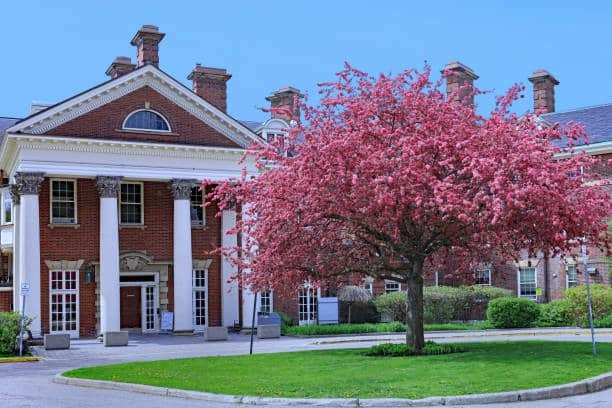15+ Best Law Schools in Canada in 2023

Source: istockphoto
Best Law Schools in Canada – It is no longer news, that Canada has one of the best education systems the world over. The education system in the Great White North is well-respected, as the nation has consistently maintained a stand in the global of the top ten countries with the best education systems in the last fifteen years.
It is for this reason that getting educated in Canada is every student’s dream. After all, the average annual per-pupil expenditure in Canada’s public schools is higher than that of any other nation in the G7.
This is in addition to its affordability, flexible options, diverse environment, and the promise of a worthwhile return on your investment if you study in any one of Canada’s world-class universities. So, if you are looking to study law or many other vocation, Canadian universities should be high on your list.
This is important because students should put a lot of thought into which law school to attend, considering factors such as the reputation of the degree and university as well as the employment opportunities that will be available to them following graduation.
In this article, we take a look at over fifteen of the best law schools in Canada, including an analysis of their respective course offerings and tuition costs.
1. University of Victoria
It is well regarded for its strengths across a wide range of fields, long-term collaborations with Indigenous people, and a profoundly held ethic of social commitment. A community of students who are varied, active, and passionate about making a difference on the world is drawn to the school because of its climate of collegiality, student support services, and great professors.
The university is home to a law school that is widely regarded as being among the best in all of Canada. It is well-knits academic curriculum’s quality, its approach to learning via experience, and its dedication to the participation of the local community and social justice.
The University of Victoria’s Faculty of Law offers the greatest number of clinical placements in relation to the number of students enrolled than any other law school in Canada. For domestic students, the cost of attending law school can range anywhere from $ 6,000 to $ 8,000, while the cost of attending law school as an international student can range anywhere from $ 14,000 to $16,000.
2. Dalhousie University
The university’s academic offerings are consistently ranked among the top 100 in the world and among the best three in Canada. It was the first university in Canada to establish a school for some essential subjects like law, and it was also the first institution in the world to do so. The organization has been around for more than a century.
The University’s faculty members are industry leaders in academia, practice, and policy-making, and they enjoy a high level of respect on an international scale. Its dedicated instructors are motivated to provide students with the greatest education possible, and they do it by bringing their own personal experiences, discoveries, analyses, and interpretations into the classroom.
One thing that makes this university unique from others is that it was the first university-based common law school in Canada. Since its founding in 1883, the university has been recognized for several distinguishing characteristics, including its intellectually ambitious and rigorous approach to the profession of law, which has served as the model for legal education in Canada, and its distinctive emphasis on public service, which is now commonly referred to as the “Weldon Tradition of Unselfish Public Service.”
The tuition for the Juris Doctor program is from 14,000 to 16,000 dollars each year, and this applies to both domestic and international students.
3. University of Montreal
This is a university that only offers instruction in French, although it welcomes students from all around the world. In addition to having been in operation for more than a century, it holds the distinction of being the first institution in all of Canada to develop a school of management. The institution provides instruction to students of all levels, and the focus of its research is on enhancing the local community.
The University of Montreal is dedicated to playing a leading role in all of these spheres of education by providing training for future leaders, scientists, and educators. Building on its extensive skills and the strengths of its milieu, as well as striving for continuous improvement, the university has made this commitment.
In addition to providing students with contemporary and pertinent academic programs, The University of Montreal also provides an extraordinary learning atmosphere and experience for its students. Students who demonstrate academic excellence are eligible for one of the many scholarships offered by the Faculty of Law.
4. University of Alberta
The Faculty of Law at the University of Alberta is the third-oldest law school in Canada and is often ranked as one of the best law schools in the country. It was established in 1912. The Faculty of Law of the University of Alberta, which was rated sixth in the 2018 QS Ranking of Canadian Law Schools, fell two places to eighth in the 2019 rankings.
Both a thesis-based and a coursework-based LL.M. are available through the institution. Students who are interested in obtaining a degree in energy law and would like the opportunity to study in the oil capital of Canada will find this college to be an excellent alternative. Students will also be presented with a variety of possibilities to network as a result of this.
5. Queen’s University
Since its founding in 1861, the Faculty of Law at Queen’s University, which is located in Kingston, Ontario, has been committed to providing students enrolled in its many law programs with superior educational opportunities of the highest caliber. In the 2019 QS Ranking of Canadian law schools, it came in at position number seven overall. The undergraduate program can be finished within three years if it is attended full-time, but it must be finished within six years if it is attended part-time.
Postgraduate students who are enrolled in the LL.M program have the opportunity to do some of their required coursework at a castle located in England. Courses in Political and Legal Thought are available to students at Queen’s University (for students interested in legal philosophy and legal theory).
6. University of Manitoba
It is possible to say that graduating from the Faculty of Law at the University of Manitoba is a ticket to a ground-breaking legal career in Canada and beyond. The interdisciplinary and forward-thinking approach that the faculty of law takes to the academic study of law has garnered praise for many years at this institution.
Being the only law school in Manitoba is a huge advantage for the institution, as it enjoys a good relationship with practicing judges and lawyers in the province who act as mentors and teach students throughout the course of their study. This allows the institution to provide students with a more well-rounded legal education.
Students in the Faculty of Law at the University of Manitoba also take part in simulated trials and competitions called moot courts. They compete against one another in mock trials, see judges in action, and represent actual clients in the judge’s chambers and in courtrooms. In addition to this, they take part in competitions on a national and worldwide level involving negotiation and advocacy.
7. York University
The location of the school can be found in North York. It holds the title of “top university in Canada” according to previous rankings published in The Economist, Forbes, and CNN. It is consistently ranked among the top schools of business in the world.
The institution is dedicated to raising the profile of education worldwide as well as the quality standards for it by implementing forward-thinking initiatives with the goal of spreading excellence.
Students receive an excellent legal education at Osgoode Hall Law School, which is housed within York University. This is accomplished with the help of a curriculum that is forward-thinking, hands-on, and pertinent; a faculty that is internationally acclaimed and recognized as a thought leader in their respective professions; and an academic community that is warm and open to all.
Source: istockphoto
8. University of Toronto
The University of Toronto is a global hub for research and academic excellence, and it is located right in the middle of the most heterogeneous city in Canada. The University acts as a catalyst for transformative learning, discoveries, and public engagement. It does this by bringing together various ideas and activities around a defining purpose: to generate value for society.
Students at every level of their professional development come to the institution to acquire the knowledge, agility, and self-assurance necessary to compete in a world that is always evolving.
The Faculty of Law at the University of Toronto is one of the most respected institution of its kind in all of Canada. The Faculty has the most competitive admissions process of any law school in Canada. The total cost of tuition & fees for domestic students is 33,320 Canadian dollars, while the total cost for international students is 44,690 Canadian dollars.
9. McGill University
This educational establishment is home to a large number of highly qualified faculty members who, when applicable, place an emphasis on a comparative or trans-system approach. There are a few experts from other parts of the world teaching at the university, and many of them are members of many important organizations and bodies both in Canada and internationally.
The innovative legal education offered at McGill is among the very finest available anywhere in the world. The institution holds the opinion that individuals who are trained in the law, sensitive to diversity, and creative thinkers have a lot to contribute to comprehending our increasingly globalized world and finding solutions to its most important challenges.
At McGill Law, some of the most renowned law professors in the world and extraordinary students hailing from all corners of the globe collaborate to teach, learn, and do research in a manner that is informed by a variety of different legal traditions.
10. University of British Columbia
The university is located in Vancouver and is accredited by AACSB. AACSB provides internationally recognized accreditation, and is one of the longest standing accreditation bodies in the world. The university is dedicated to rigorous and relevant teaching and offers a global perspective to education. This innovative approach to education is aimed at training global leaders in different fields who can drive change and shape industries and organizations around the world.
Each program at the university strives to foster a respectful, collegial environment. The environment is designed such that experiential learning becomes very easy. You learn inside and outside the classroom. From co-ops to internships, global immersion and volunteer opportunities. The school offers high quality programs and once ranked among the top business schools in Canada.
The Peter A. Allard School of Law at the University of British Columbia is recognized as one of the leading law schools in Canada, and has a reputation worldwide for innovative research, inspiring teachers, and outstanding graduates. Its students are academically outstanding, intellectually curious, and trained to use their knowledge in helping others.
11. Western University
According to the rankings provided by Times Higher Education, Western University’s Faculty of Law is one of the best in all of Canada.
And when compared to other law schools, the Faculty of Law at Western University possesses a stronger reputation as well as more credibility in the field of business law.
12. University of Ottawa
The University of Ottawa is recognized as a frontrunner in a variety of academic disciplines around the world. In addition to this, it offers some of the most comprehensive collections of courses that take an international point of view.
The Human Rights Research and Education Center at the university is well-known all around the world. In addition to this, it is the home of the IUCN Academy of Environmental Law, making it a national leader in several important subjects.
The institution provides students with a wide range of “hands-on” learning opportunities at various centers located on campus. They also have the opportunity to learn from industry experts who have won a number of prestigious accolades in their respective fields.
The Faculty of Law at the University of Ottawa offers students the best opportunity in the world to study Common Law, Civil Law, and Indigenous legal traditions in English or in French.
13. Carleton University
The institution is committed to the advancement of creative research, teaching, and learning, and it actively promotes experiential learning in the classroom. Graduates are provided with great student assistance and are educated to graduate with an entrepreneurial spirit in order to better prepare them for professions in a world that is always evolving.
Carleton University is home to a community of academic and staff members who are brilliant, devoted, and enthusiastic about their work.
14. Universite du Québec
With approximately 40,000 students spread throughout its three campuses in Montreal, the Universite du Québec is the most populous public French-language institution in the province of Quebec. The University of Quebec at Montreal (UQAM) provides students with access to a diverse selection of academic programs that can lead to either an undergraduate or graduate degree.
It has strong ties with industry through its research institutes and offers many degree programs based on applied sciences and it also provides an array of career services available free for all students who may want additional help in finding what type of job will suit them best after graduation
At the University of Quebec in Montreal (UQAM), the cost of tuition to study law is very low when compared to what applies in other Canadian universities, with fees starting from CAD$3,910 for students coming from within Quebec and CAD$9,691 for students coming from “out of province.”
15. University of Calgary
The University of Calgary is a dynamic, alive, and youthful institution that welcomes all sorts of change and opportunities in its pursuit of academic excellence. The Faculty of Law at the University of Calgary is placed tenth among Canadian law schools according to the QS Ranking for both 2018 and 2019. The faculty has more than 378 undergraduate students.
When compared to other law schools across Canada, the University of Calgary’s courses are significantly smaller, which is one of the institution’s many strengths. Because of this, pupils will have more time to spend with their respective teachers.
16. University of Laval
The academic offerings at Laval University are extensive and varied, and the institution is focused on the needs of its students. The instructional methodology is founded on a legacy of academic superiority that spans all levels of study and was developed by its illustrious faculties.
The Faculty of Law at the University of Laval is responsible for the education of thousands of well-known attorneys. A good number of them have played or are presently playing roles of uncontested leadership. You will be able to develop a profession that is commensurate with your aspirations if you attend the Faculty of Law, which is one of the largest in the country.
Source: istockphoto
Benefits of Studying in the Best Law Schools in Canada?
Students who choose to pursue a legal education in Canada have access to a comprehensive educational experience that is packed full of enticing opportunities. To begin, the cost of tuition is somewhere between one third and one half of what it would be in the United States. Additionally, the government provides a greater amount of financial assistance to students there than it does in the United States.
The law programs are also highly valued on an international scale due to the fact that law schools in Canada have created distinctively Canadian viewpoints on the law as well as Canadian legal systems. There are a great number of factors that make Canada the ideal location to pursue a legal education.
To begin, the educational programs offered at Canadian law schools are of a particularly high standard. They teach students skills that will enable them to find job in a variety of locations across North America and even the rest of the world, as well as prepare students for entry into an international labor market.
One such incentive is that the tuition costs in Canada are among the lowest in the world, and the government makes grants available to students who meet certain requirements.
Last but not least, the government of Canada provides student visas, which might facilitate your search for employment in other countries.
Source: istockphoto
Best Law Schools in Canada FAQ
(a) Which Canadian province is best for lawyers?
If you are an attorney with foreign training who is interested in advancing your career in the legal field, Toronto, Ontario is the place to be. The province is the most multicultural in Canada; it has a dynamic culture that was built on the hard work of generations; and it attracts some of the most accomplished and intelligent people from all over the world.
(b) Is law a good degree in Canada?
In addition to being one of the professions that pay the highest salaries in Canada, the legal sector is also the one that is suffering from a severe lack of available labor. Consequently, once they have received their degrees, students have a wide variety of professional options available to them with a chance to land one of the best paying jobs in Canada.
(c) How hard is the LSAT Canada?
The Law School Admission Test, sometimes known as the LSAT, is notoriously challenging for three primary reasons. First, it is a measure meant to test abilities that undergraduate students may not have completely acquired. One illustration of this would be the deductive and inductive thinking skills required for playing logic games; these are the kinds of skills that are normally taught to science students.
(d) Which is the easiest law to study?
In comparison to other subspecialties of law, real estate law is widely believed to be the field that presents the fewest challenges and presents the greatest opportunity for entry. In addition to mastering the fundamentals, a real estate lawyer needs to be familiar with the specific clauses that are frequently found in a variety of real estate situations.
Conclusion
If you are looking to get a degree in Law, Canada should be high on your list of destinations. This is because Canada has one of the best education systems in the world, offering you the chance to get world-class education without actually breaking the bank.
If you are looking to study Law, you’d need to study at one of Canada’s most reputable universities. This is because giving attention to the law school you want to attend helps you take certain factors into consideration including the reputation of the degree and the university, as well as the employment chances that will be accessible to you after graduation.
In view of this, this post gives you an insight into the 15 best law schools in Canada. Apply to study at any one of them, and you will be glad you did.
SEE MORE: Guide On How to Find IT Jobs In Germany 2023



